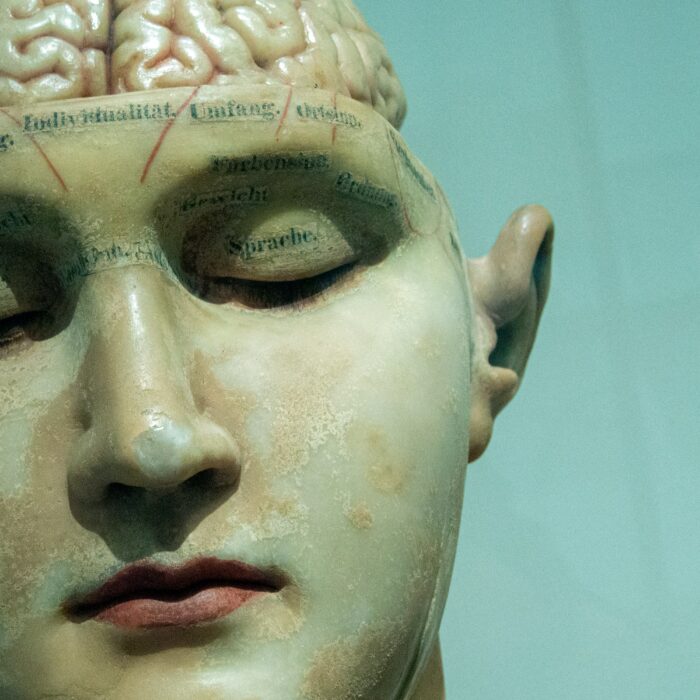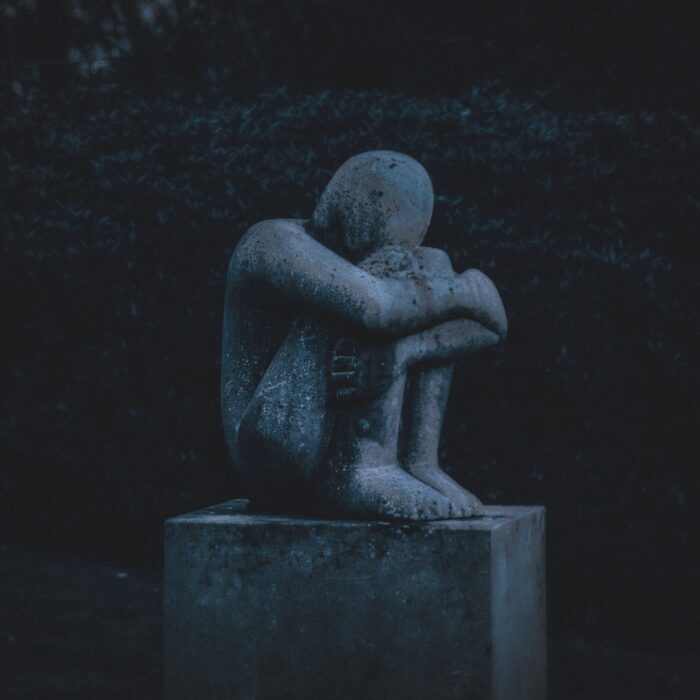You have no items in your cart. Want to get some nice things?
Go shopping
I
Jorie Graham, “Fission” and Anne Carson, “Decreation”
Today’s stomach ache reminds you of a time in high school when you went to the movies with your friends and the film wouldn’t start on time, so the theatre workers just played the Righteous Brothers for thirty minutes instead. Someone yelled at your friend for talking on her phone and you thought it was funny because there was no movie to interrupt. Only a gray screen and “Unchained Melody” over and over again. Keep waiting, keep waiting, for the movie, for your friends, you told yourself. Later you’d say, “it’s okay” when they asked you in the theatre, in the hospital. “I feel good about this.” And you do feel good about the movie, whatever movie it is. You don’t start feeling sick until the voices break and the first scene appears suddenly, violently. It is the same burn you carry in your stomach after they scorch out the masses and tell you we’ll have to do this again every two years. “Okay,” you say. “I’m okay.”
You don’t remember the movie, but you remember when the Brothers crooned “I neeeeeed your love” and the notes stretched all the way to the ceiling. You remember how you sat waiting for previews before the sad music could start, but the music came first. What do you do when the music comes first? You let them undress you and touch you so you can shake their hands a few minutes later and pretend they haven’t seen any part of your body. So you can look into their gray-screen faces and say “thank you” while they shut off the music and pull the movie in front of your eyes so fast that you don’t have time to adjust. You learn to want the song over the movie, the screen over the story, the lamentation before the onslaught of colors. The waiting over the knowing. They tell you to wear your gown backwards until you forget how to tie it the right way and you can’t remember if it is your gown or you that is backward. You sit in the dark theatre with your friends while workers above you scramble to fix the broken movie, and you can’t help but feel a little sad when they find what’s wrong and the music ends.
II
Elizabeth Bishop, “The Man-Moth”
On the way back from the doctor’s office, my mother and I have to pull over and wait for the rain to subside. It is the day before my twentieth birthday and mist rolls onto the window like the fog I remember from my first (and only) drive-in movie. My mother and I order ice cream and watch as white vanilla teardrops run down our hands like rain on the windshield. We have ordered ice cream together for as long as I can remember, for almost twenty years. Today our umbrella is broken and everything inside the car is wet. Our faces. Our hair. The drive-in movie wasn’t wet, but it was cold like it is now. My best friend (who is no longer my friend at all) and I sat on the hood of her car while the movie crackled so far off in the distance that we could hardly see. By the time it was over, my feet had turned blue and were so numb that I couldn’t walk. I was scared. Real fear. I imagined hobbling into the hospital with black toes and the doctors saying there was nothing they could do. We’ll have to cut it all off. But my friend laughed and thought I was joking. Even now my feet stay cold all the time, no matter what season it is or how I dress. Even now as I sit in the car with my mother. And it is funny because my cold feet are all I have left of that moment. Every now and then I remember how I felt sitting on the hood of my friend’s car while I pretended to laugh. The two of us were on the upward slope of a hill and the air was almost white with cold. We never fought. We simply fell into a silence that never ended until the space between us became impossible to fill. I wish I couldn’t remember the movie because I don’t know how to remember it. Still, sometimes it comes creeping back into my atmosphere and then it gathers into black clouds that rain heavy on my head until I must pull over and wait for them to pass.
III
Robert Hass, “Novella”
I was watching a movie when my uncle died. His was the first death in the family, and I think about him today even though I never knew him. Tower bells ringing outside remind me of the movie. It was about Christmas. My sister and I were in our pajamas when our mother told us he was dead. Sick from something. Who knows what. Had been sick his whole life. When I think of my uncle, I think of the happy farm animals in the movie that granted an ill boy his holiday wish. My uncle becomes the movie and the movie becomes his illness. I think maybe this transmutation of being occurs when what Anne Carson calls the “sleep side” invades your very being. Only a broken mirror world, only something you weren’t meant to see awake, can turn a dead man into a movie or a movie into the bells singing across campus. And now somehow Christmas makes me both sad and happy and every movie reminds me of that first one, of when my mother came into the room with a letter in her hand and turned the TV off. The farm animals were in the middle of a song.
I have something to tell you. I have something to tell you.
That I remember this is my own little secret because I know no one knows I remember. Instead we all act as if my uncle was never real, and I always play along. It was so long ago that I can now imagine the scene just the same without me in it. I can see the news of his death creeping through the window into our house while we are asleep. We should have been asleep. We were only awake for the movie. My grandmother’s favorite movie. She died in 2005. Emphysema. I remember though. I remember the boy’s Christmas wish. He wanted to be healthy, and at the end he was healthy and could sing like an angel.
IV
Anne Carson, “Ode to Sleep” and Walker Percy The Moviegoer
The pain in your gut wakes you up again, and for a long time you have to marbleize your bones just so you can move in ten minutes when the alarm goes off. On these mornings, you are thankful you have the top bunk so your roommate doesn’t have to watch you hold yourself as still as rigor mortis and wonder what’s wrong with you. The day before the procedure, you couldn’t stop throwing up and the day after you couldn’t stop yourself from thinking about it. You think about this push and stop as you’re reading The Moviegoer. Books and TV become your way of returning to the old you because you can remember how you used to feel while you’re reading and watching them. You think maybe Walker Percy had it wrong when he tried to destroy the everydayness of life because everydayness has not been a part of your every day for a long time. That old feeling of routine feels so abnormal now.
Later you give your presentation on Percy and everyone laughs where you want them to laugh. They clap for you and your stomach doesn’t hurt anymore. Two healthy older women in the class, probably in their sixties, tell you they loved your speech, that they have never heard of The Moviegoer but will read it now. Then the taste of acid returns to your mouth and for a moment you have lost your “this,” have glanced into a theatre you never knew existed and don’t know how to enter. A movie is playing that you have never seen, have never been a part of. In that second, your sentence starts with a different word, a different “this.” You spend the rest of the day erasing and erasing but the mark is always there; the imprint of the theatre on your eyelids remains.
V
Seamus Heaney, “Punishment” and a snippet from T.S. Eliot, “The Love Song of J. Alfred Prufrock”
Not a big audience here. Cold room. Hard chair. In half an hour I’ll lose my concentration. My back will hurt. Wait and see. Two people on my left and one behind me. Our mere existences distract me. I always have a hard time leaving my world and entering another. Someone I know once said watching movies is like becoming a snake and shedding your skin to make room for the new one. Lights cut off. Music starts. The bolts in my chair are deafening. Every turn of my legs disturbs the universe. We slump in our seats, each of us struggling not to trouble another. Fifteen minutes in and someone whispers “sorry.” Last apology I hear. Last real voice.
Big scene now. After an astonishing, sacrificial move, the villain pulls the hero to safety and they lay gasping together. Raining. Villain lowers his head and weeps over what he has lost. He dies. Light returns. An awkward moment occurs in which we all turn to one another, wide-eyed, guilty, and removed. Not quite ready to admit how much we have enjoyed watching a man die. I see his death still in their eyes. Seamus Heaney calls us “artful voyeurs.” Movies are a non-soldier’s only warzone. Our only way of entering the trenches. Don’t feel bad. None of it’s real. Outside it feels real. When I see no clouds. When I feel my back hurt.
Leaving now. Old skin coming back to me. Everything comes back. Three people walk ahead. Two behind. I feel the “stones of silence” drop from our pockets as we go. A heavy sound follows. Again and again. I pray. Please, nobody say a word.
VI
Rae Armantrout, “Birth Order”
When my roommate says we’re watching a movie tonight, we watch a movie tonight. Usually comedies with good-looking men. They always sing and dance and they always get the girl. Tonight we watch one about a rich woman who moves to a foreign country after becoming disillusioned with her old life. There she meets him — the handsome man, and they fall in love and the movie ends with singing and dancing. My roommate wants a singing, dancing ending. She worries she’ll never fall in love. That movie men will never want her. I know she’s wrong, that she will, and that they have. I can’t stop thinking about the rich woman who gives up her career for love and a different country. In the dark of our dorm room, her new world makes up only the twelve inches of my roommate’s computer screen. I imagine her two houses are really next door to one another, maybe just pixels programmed into green screens. I know the romance is false. I never know about the disillusionment, the sickness that drives them away.
My roommate waits until we are in bed to ask how I am feeling. I have the top bunk and conversations like these work better when we can’t see each other. I don’t know how to organize my expression when she asks. Last time she cried. The moment still feels more like a movie to me. Right now evening light paints the ceiling in green hues. The woman in the movie lived in a cottage covered in greenery. Green is a sick color. The gravity of the question and the cottage interfere and overwhelm one another — realities come together. For a moment I imagine my roommate and I in a different country, in a room like this one. She is singing and dancing. Maybe crying. The world is the same everywhere. But in this timeline we can meet gazes when she asks how I am feeling. Sappho’s poem comes to me. “Greener than grass,” I want to say. But if I say that here, in our little room, in our country, she will turn in her bed and fall silent. The “possibility of never-having-been-seen” does not make it to the big screen. The ones who stay behind lose their spotlight. They fade into the audience.
She and I are not actors; we have one part to play. I got to change mine. Really, don’t cry. I feel good. It’s one of the best things that ever happened to me.

About Madeleine Gallo
Madeleine Gallo is currently a first year MA student at Wake Forest University. Her work has appeared in Susquehanna Review: Apprentice Writer, Fermata, Sun and Sandstone, Belle Reve Literary Journal, The Pylon, Into the Void, and Rattle. After graduation, she plans to pursue a PhD in Contemporary American Poetry.




